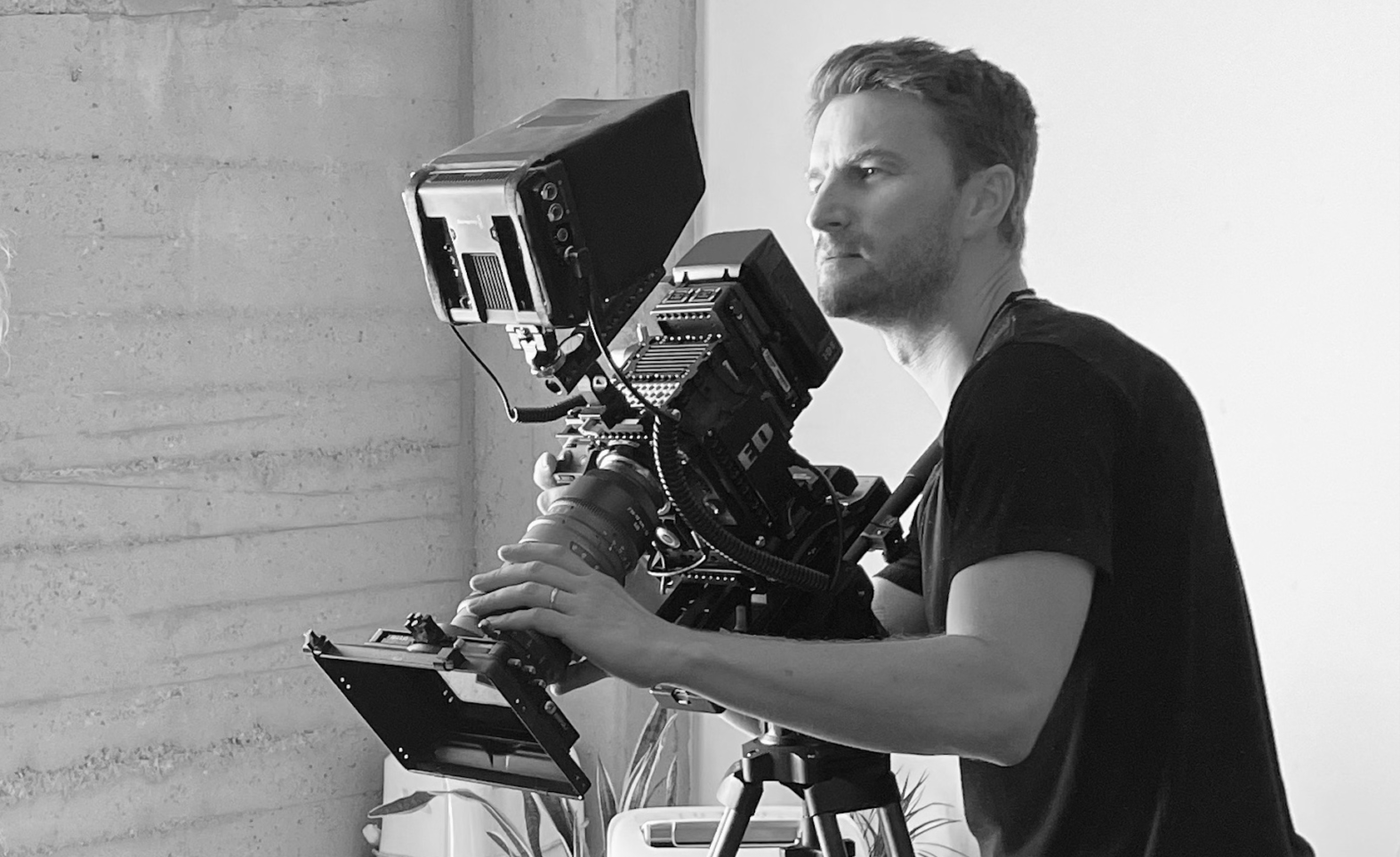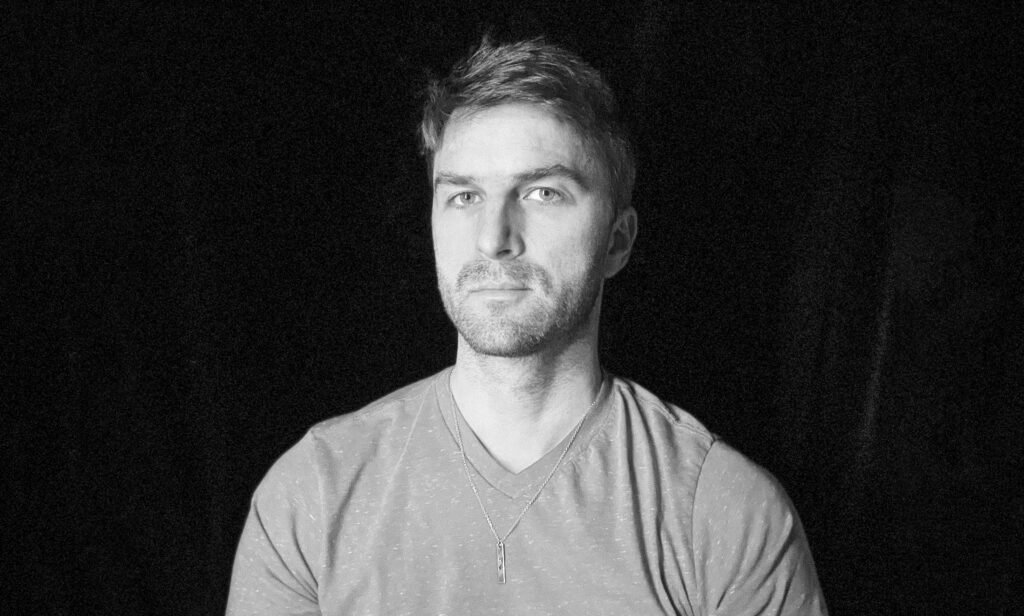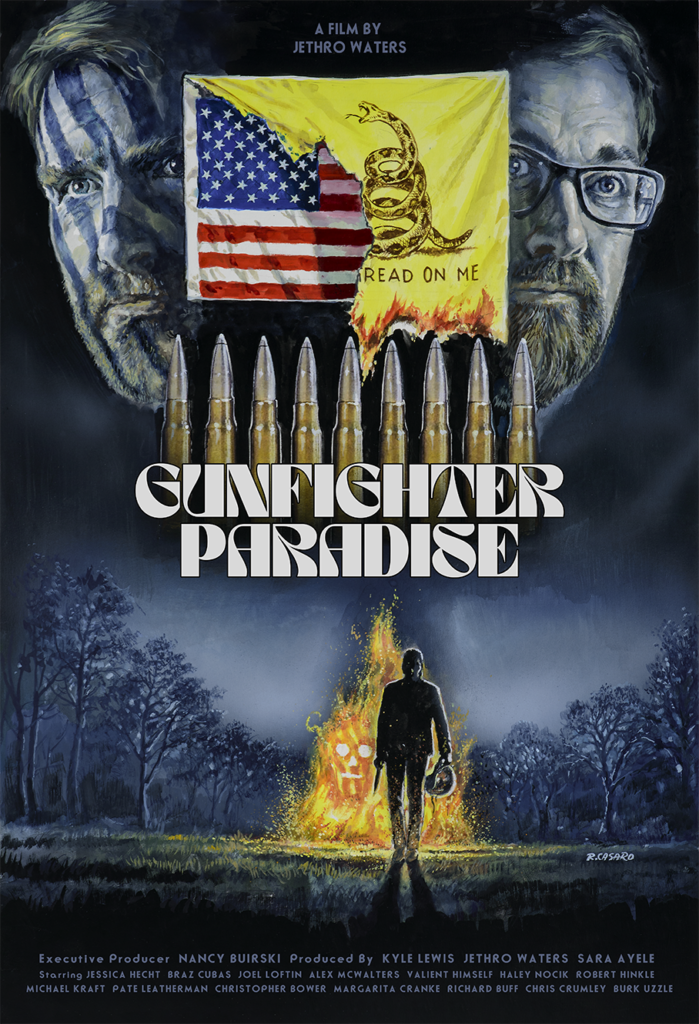The Other Side of the Mountain – memories that bind us across generations.
Yumeng He’s short documentary 'The Other Side of the Mountain' feels ...

Filmmaker Jethro Waters has a penchant for blending dark comedy with stark realities. He shows that in his latest film ‘Gunfighter Paradise’.
Through his unique perspective, he delves into the complexities of southern identity, religious neurosis, and mental health, offering audiences a raw, yet humorously dark reflection on life’s multifaceted nature.
His journey as a filmmaker is an interesting one and he shares it all with us in this eye-opening conversation.
Jethro – I found a naturally mummified cat in a barn once. More accurately, I stepped on it. The hollow crunch that came from under my sneaker sent a peculiar shiver up my leg. I leaned down to look closer at the loose dirt and dust and saw a perfectly preserved feline husk, fangs pearly white, ears upright, and a paw curled up under its jaw. Eugene, the mummy cat who instantly became a fixture in Gunfighter Paradise, is certainly the most incredible thing I’ve found on any location scout.
I write a substack called Wax & Gold, which is centered on independent moviemaking, and the beautiful madness of growing up in the south: jethrowaters.substack.com
Jethro – My first answer for this question turned into an essay. Let me simplify it by saying that the inspiration for this film comes from a desire to explore southern identity and religious neurosis.
Jethro – The opening voice over monologue with the description of how burnt gunpowder smells, and the tale that is woven around that smell, is all true. The scene about the mother’s foot – that’s all true. My mother actually does have webbed toes – that’s her foot in the film – and the ring toe on her left foot was cut off during the accident with our wood stove described by Stoner in the film. The VHS footage of the kid speed shooting at a competition pistol event, that’s me when I was around 12. The way Stoner’s parents are portrayed in the film is very true: the father as a very stern but loving Vietnam Vet turned professional gunsmith, and the mother as a very whimsical, free spirited puzzle-maker. The couch scene where Joel and Stoner take turns using the truck to pull the couch around a field with a rope, each taking turns riding on the couch, that was something my friends and I did as teenagers. There are so many other scenes and details that are wholly autobiographical or semi-autobiographical.
Jethro – A lot of us have experience with mental health issues or with mental illness, either directly or through close friends and family. Making a film that looks directly at how a person’s mental health is affected by religion, by dogmatic and inflexible belief structures – this has always been very important to me. For most of my life I’ve been thinking through the many questions posed in this film. This film addresses mental health in a somewhat curious way because it’s a very dark comedy and a lot of the main character’s mental health issues are rooted in religion. That’s not to say that religion is the only culprit. But the specific breed of religion I’m confronting in this film certainly seems to be an accelerant in the disintegration of mental health and happiness for a lot of people.
Jethro – Laughing during a funeral is a very special experience. Often there is joy to be found in the darkest of times. I think the balance comes from the pacing and the rhythm of the film. Blending dark comedy with horror requires that the script have a sense of balance between the gruesome scenes and the subtle moments of dry comedy. I think of it the same way the tone (or mood) of a song is maintained even when blending genres – through the timing and rhythm.
Jethro – Maurice was my favorite character to create. He doesn’t have a single world of dialogue in the entire film, but he conveys so much through his actions in each of his scenes. In real life, the actor who plays Maurice, Alex McWalters, is one of the sweetest and kindest human beings I know. And yet, he gives one of the best cold blooded evil assassin performances ever in the film. Alex, in general, just has the look of a handsome black-hat cowboy villain. We’ve been friends for more than 10 years and the moment I met him I knew at some point I would cast him as a killer in something.

Jethro – The most challenging aspect of making this film was making a micro-budget film feel like an expensive production. And as difficult as it was, achieving that goal has been incredibly rewarding. At every film festival, every screening, anyone who asks about the budget has been shocked that we made this film for around $28,000. The entire cast and crew are friends, everyone threw in their time for free, people took off work, cast / crew brought their kids to the sets if there wasn’t a babysitter available, the locations were all real houses or farms or restaurants owned by crew members’ families, we sifted through thrift stores and flea markets for all the props, and so forth. With this kind of production there isn’t ever a proper schedule, rather, we were booking small sprints of days whenever people could make themselves free. The film takes place in fall, and I ran out of time the first year, so in order to maintain continuity of exterior scenes, I waited until the next fall and finished the film.
Jethro – My hope is that the audience is entertained. If they find some (or all) of the subtle nods and easter eggs to my favorite writers and poets and philosophers, and want to see the film again, that would be an excellent takeaway. If the audience is left conflicted – asking questions about The United States vs. Religion vs. mental health, that would be the ideal.
Jethro – I just recently finished a new horror script, based on true events, around the very first women who were accused of and executed for witchcraft in America. This predates the Salem Witch trials by 40 some years. I’m working with some great producers on getting that script into production soon. I’ve finished a Neo-noir western script I’m shopping around. I’m also currently working on a documentary feature about American war veterans.
Jethro – Making a feature film of any kind is a monumental task. Creating a truly independent narrative feature film without much of a budget, without rehearsals, without permits, relying on borrowed time from a constantly shapeshifting cast and crew of friends – all filmed on locations provided by gracious strangers – this is an experience like no other. And now after having completed two no-budget feature films like this, one doc and one narrative, here is my advice for anyone who wants to give it a go: You must be ruthlessly adaptable in the planning and execution of your film.
Also, Nothing is precious.
In terms of experimental films I would offer this: try to bend all of the edges of storytelling, but don’t try and break them entirely. If you make an experimental film that a general audience can watch and understand front to back – that will get you far. If you make experimental films that only you can understand – building a successful career on those kinds of films will be very difficult. This is a hard, brutal, unfair business. The very best filmmakers are not often the ones who get to make the big films. But any career making films at any level is a true privilege and an honour. And I have never had an experience as wonderful as a theatre packed full of strangers transfixed, watching my work up on a 40-foot screen.
No matter what genre you are working in, filmmaking is a marathon. Endurance matters most. Some folks start off with a lot more talent than others, but it is not about the amount of talent. It is about your ability to develop those talents, and to use them, to not give up, and to keep going. One step at a time, one day at a time, you keep going until the work is complete. And then you keep working for years after it is complete to get the work out in front of people. If you love the work you will keep going.

Undoubtedly, Jethro Waters’ ‘Gunfighter Paradise‘ is a testament to the power of independent filmmaking and the importance of adaptability and perseverance.
His journey and insights remind us that while the path to creating meaningful cinema is demanding but it is also immensely rewarding, filled with moments of profound connection and creative fulfillment.
Jethro’s advice to aspiring filmmakers is clear; embrace the challenges, stay adaptable, and never lose sight of your passion. Just as he has and steadily thrives in what continues to be a very challenging field for any creative.
We are excited to see his upcoming projects that would explore historical horror and contemporary documentaries.
In Conversation With Reina K., brings to you the kind of scoop that gives you a real insight into the mind, drive and craft of filmmakers from across the world.
Leave A Reply